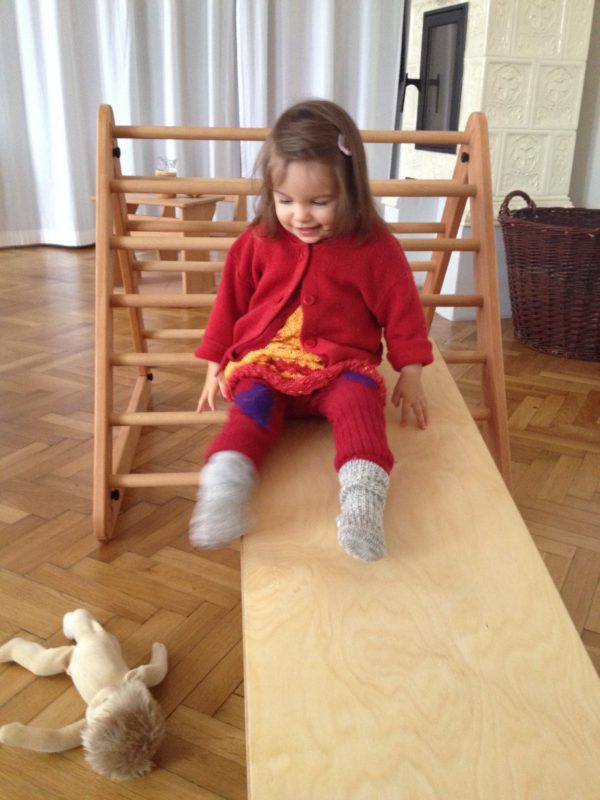Project Description
The Pikler Approach
What is the Pikler approach?

The Pikler approach emphasizes respectful daily care and giving the child time and space to move and play autonomously, without adult interference. Its founder, Dr. Emmi Pikler (1902-1984) was a Hungarian pediatrician. She’s known for revolutionizing how we think about and care for babies and small children. .
How often do we pick up, touch, or try to entertain our baby without paying attention to what the little one was engaged with already. How often do we interact without telling our child what we intend to do? We don’t think twice about interrupting infants and toddlers; it doesn’t occur to us to value what they are doing. How would we adults feel if someone, for example. grabbed our face or put a pacifier in our mouth without telling us what’s going on?
Dr. Pikler’s fundamental attitude was that we should respect the needs of children, however young. We should recognize them as individual and complete people. Her work shows us what a newborn needs in order to be able to grow up satisfied and at peace with himself.
The 3 main principles of the Pikler Approach:
-
Respectful Daily Care
-
Autonomous Motor Development and
-
Self-initiated Exploration and Free Play

# 1 Respectful Daily Care
In the Pikler approach, daily care routines, such as breastfeeding, bottle-feeding, changing diapers, bathing, dressing and undressing are the adult’s best opportunities to satisfy the child’s need for security and affectionate attention. This care should inspire the child’s trust, meet his fundamental need to feel seen, and leave him feeling untroubled and joyful. As we care for our child, we can give her our undivided attention, using this time to get to know her better.
Empathetic care includes telling your baby in advance what you plan to do and what she can expect to happen next. Give her a little time after you tell her, waiting until you have the impression that she’s ready for the next step.
For example, “Look, Sawyer, here is your shirt, and now I’m going to put it on you.” Tell him this and wait until he has gotten used to the idea before putting on his shirt gives him confidence and lets him know that you value him. This act of waiting is your moment of connection and often reveals wonderful surprises.
Just from observing your child in these moments, you can tell by her looks, gestures, and movements how she feels about what you’re doing, and through these “ordinary” moments, you can build a strong, trusting relationship.
Dr. Pikler writes: “Getting to know each other is of course reciprocal. While we get to know our child, our child also begins to get to know us, and particularly our hands. Our hands form the first relationship of a baby with the world (apart from breastfeeding). Our hands lift up the baby, lay him down, wash and dress and perhaps feed him, too. What a difference: how different is the picture of the world that is revealed to a baby when calm, patient, caring, but also secure and decisive hands take care of him – and how different the world looks when these gestures are impatient and rough or hurried, agitated and nervous.”
Respectful and empathetic care routines offer a beautiful opportunity for our baby to interact with us. This is a foundation for her ability to cooperate and form relationships, as well as for her social development.
When a child has had enough mindful interaction while being cared for, she feels appreciated, protected in her environment, and free to investigate herself and her surroundings.
“Before I learned about this approach, how often did I, for example, pick up my daughter or dress her without telling her what I intended to do or without observing her physical reactions? How different do I feel, for example, when I’m worried and insecure about a visit to the doctor if I feel totally seen and empathetically and gently touched by my caregiver? Babies and toddlers experience the same thing!” Pia Dögl, Parent Coach, Hypnotherapist & Founder of Beginning Well
# 2 Autonomous Motor Development
As a primary care physician for families with young children back in the 1930s, Emmi Pikler recognized the value of children’s independent activity and autonomous motor development for the unfolding of their personalities. She made it clear that children are naturally capable of sitting up on their own and of learning to stand up and walk by themselves. When the child is ready, physically and emotionally, they will naturally learn how to do these things on their own. In this learning process, any kind of support from adults is not only unhelpful but can actually have negative consequences. For example, she describes what happens when a baby is brought into a sitting position too early, when the musculature and the spine are not yet strong enough:
“The whole torso sinks down flaccidly, the spine is curved, the stomach and rib cage are pushed together, and therefore the inner organs and breathing are also hampered. It is most indicative that we fear that the child could topple over at any moment.”
A baby who sits up on his own does not sit hunched but holds himself noticeably straight (see picture below).
Children themselves attempt things in the course of their motor development when they feel ready. The child has an intuitive knowledge of his own motor capabilities, and out of this he knows what he can attempt as he develops these motor skills. Of course, the child still requires an attentive adult in case she gets into a situation which could be dangerous. But the Pikler approach lets the wisdom of the young child guide her own development

# 3 Self-initiated Exploration and Free Play
In free play, children develop dexterity and stamina. They practice their various skills and feel that they can have some effect on the world.
Dr. Pikler writes: “It is important that children discover as many things as possible for themselves. If we help in solving all tasks, we rob them of precisely what is most important for their mental development. A child who achieves something through autonomous experiment gains a completely different kind of knowledge than one who has the solution served ready-made.”
Reduce stimulation and entertainment whenever possible!
While It’s tempting for us parents to entertain our babies, our participation in their play has the tendency to take over and distract them from their own discoveries. The more we play with him, the more our child waits for “what’s coming next” from us and follows our lead rather than initiating and creating plans of his own.
And one of the many benefits of self-initiated, independent play is that parents can usually leave their engaged, content child alone briefly while they do chores, use the bathroom, check email, etc; of course you can only do that if the child is playing in a safe spot.
More about Dr. Pikler’s work
In 1946, Dr. Emmi Pikler founded a residential nursery in Budapest, Hungary, the Pikler® Institute, where the focus was to preserve the competence, autonomy, and integrity of young children, ages 0 to 6 years. Thousands of participants from around the world have attended trainings onsite at the Institute, which is now known as the Pikler® Daycare Center. In those trainings, Early Childhood experts, health professionals, and parents learn about the practical applications of the Pikler® pedagogy – to bring up infants and young children with empathy, gentleness, and respect.
In addition, there are a number of Pikler associations worldwide, including throughout Europe, Asia, North and South America, where certified Pikler® trainers lead workshops in this groundbreaking pedagogy.






